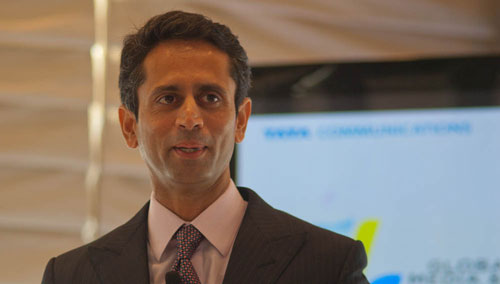
India’s Tata Communications, which owns a controlling interest in local telecommunications operator Neotel, says SA is crucial to the company’s strategy of expanding into Southern Africa and into the continent more broadly.
To do this, Tata Communications CEO Vinod Kumar says the company needs to deepen existing partnerships in the region and forge new ones. He won’t be drawn into acquisition plans, but says they are on the cards and will be done to bolster its network capabilities and brand recognition. They will “definitely be part of the company’s growth strategy,” he says.
In a company of 7 770 employees, SA is Tata’s second biggest market in terms of staff count, with 12% of the workforce accounted for by Neotel.
Kumar says one of the benefits of a large emerging markets base is that it “reduces risk from economic cycles and multiple markets help us de-risk and provides economies of scale”.
It’s clear Tata has global ambitions. The company said on Wednesday that its network of wholly owned submarine cables now encircles the globe.
Kumar says the cable network — which has cost the company in the region of US$800m to date — gives it the ability to route traffic either east or west should a problem occur somewhere on the submarine network, which consists of more than 63 000km of fibre.
The latest component of this network, and the one that completes it, is the TGN-EA Eurasia cable that runs from Mumbai in India to Marseilles in France. Kumar says it makes an already-resilient network even more stable and Tata now hopes to bolster it even further by expanding its cable network in the southern hemisphere.
Already, Tata has capacity on the high-capacity cables landing in SA, including the Eassy (the East Africa Submarine System) and Wacs (the West African Cable System).
With growing demand for connectivity in Latin America, Kumar says Tata wants to participate in various cable systems in that region. “We’re exploring a couple of opportunities to participate in cable systems to the area, but these probably will not be 100% owned [by Tata].”
Kumar says Tata’s strategy is underpinned by emerging-markets companies that are expanding into the global marketplace. “In 1995, only 20 of the Fortune 500 companies were from emerging markets; now that number is around 100.”
Submarine cables will play an ever expanding role in meeting the increased demand for data globally. “Tata’s submarine cable network means Tata now own 25% of the world’s lit, international capacity,” Kumar claims.
Tata’s network handles 73m voice calls each day, 3 200 petabits of data cross its Internet backbone each month, and it has 1m square feet of data centre and collocation space spanning 42 data centres.
Kumar says another motivation for growing its submarine cable network, along with its terrestrial networks, is so the company can position itself at the centre of three trends: emerging-markets growth, converged Internet protocol networks and managed services and industry applications.
Almost three-quarters of Tata Communications’ revenues are generated outside its Indian home base. The company has a presence in 31 countries and Kumar says that, of these, the emerging markets are showing strongest growth, with much of the developed market flat as a result of ongoing economic woes. — Craig Wilson, TechCentral
- Wilson travelled to Dubai as a guest of Tata Communications
- Subscribe to our free daily newsletter
- Follow us on Twitter or on Google+ or on Facebook
- Visit our sister website, SportsCentral (still in beta)

